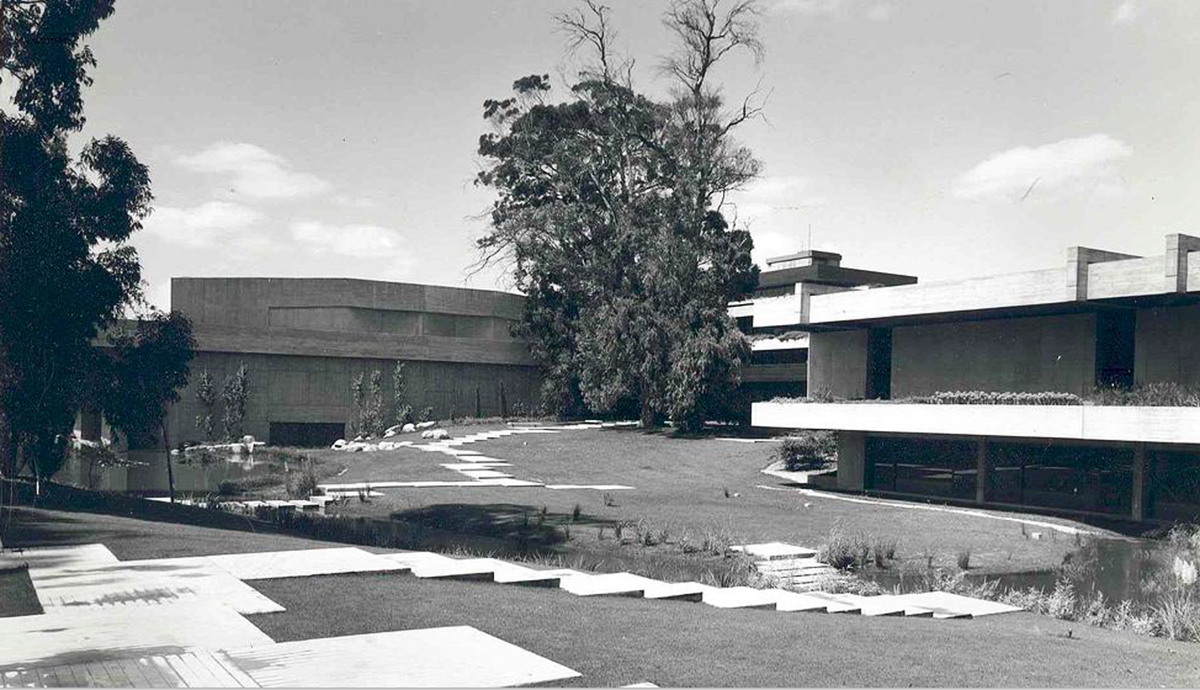Submitted by WA Contents
Call For Papers for DOCOMOMO 14th International Conference
Portugal Architecture News - Aug 31, 2015 - 13:59 4731 views

Alberto Pessoa, Pedro Cid, Ruy Athouguia, Calouste Gulbenkian Foundation. Lisbon,Portugal,1969. Gardens by Viana Barreto e Ribiero Telles. © AFCG, Mario de Oliveira, 1969.
Call for Papers: Docomomo 14th International Conference – Session: Retrofitting the Modern: The Preservation of Post-War Social Housing Estates and their Adaptation to Contemporary Environmental Standards.
Docomomo International invites researchers and practitioners involved in the process of preservation, conservation, renovation or transformation of buildings, sites and neighbourhoods of the Modern Movement, to investigate on the theme: Retrofitting the Modern: The Preservation of Post-War Social Housing Estates and their Adaptation to Contemporary Environmental Standards. Docomomo International is now accepting abstracts for the 14th International Docomomo Conference that will take place in Calouste Gulbenkian Foundation, Lisbon, Portugal, September 6-9, 2016. Please submit abstracts no later than October 18, 2015(12 pm GMT).
The session will consist of four papers, followed by 20 minutes for discussion. Each paper should be in English and take no more than 20 minutes to present. Conference papers will be published in the conference Proceedings.
Abstract Submission Guidelines
You may submit your abstract by visiting the Ex Ordo abstract submission system: http://docomomo2016.
Once registered, the submission must be done, in English, by filling the following required information:
1. Title (65 characters max) & Abstract (400 words max);
2. Authors information (Name, University/Company/
3. Biography (200 words max);
4. In the "Topics" section: COMPLEXES.
5. In the "Additional Info" section, please indicate your phone number and address.
Abstracts should define the subject and summarise the argument to be presented in the proposed paper. The paper's content should be the product of well-documented original research that is primarily analytical and interpretive rather than descriptive.
Papers may not have been previously published, nor presented in public.
Only one submission per author/co-author will be accepted. Each speaker are expected to pursue their own institutional or other support to register, and for travel and accommodation.
Read the paper submission guidelines, in case of your abstract being accepted.
Schedule
Call for papers: 3 August - 18 October 2015
Call for papers' notification of acceptance: 30 November 2015
Registration deadline for speakers and session chairs / Full paper submission deadline (1st version): 14 February 2016
Deadline for session chairs return papers with comments to speakers: 13 March 2016
Full paper submission deadline (final version) / Full submission of the key lecture of the session: 17 April 2016
6-9 September 2016 - Docomomo 14th International Conference
For Session Themes and further information, please see: http://www.docomomo2016.
Session: Retrofitting the Modern: The Preservation of Post-War Social Housing Estates and their Adaptation to Contemporary Environmental Standards
Since the advent of the Industrial Revolution, the need for housing has remained one of the main preoccupations of modern architecture. The leap from London’s 1870s suburbs, famously and dramatically depicted by Gustave Doré, to the Existenzminimum adopted as the topic for CIAM 2 in Frankfurt (1929) shows the growing concern with low income housing. Defining the minimum requirements of habitability, and designing affordable yet respectable housing estates thus turned into an ongoing theme since the beginning of the 20th Century, and a major concern of modern architects. This concern became even more prevalent in the post-war period, when the need for massive amounts of inexpensive dwellings appeared perhaps as the most urgent task in the reconstruction of a war-devastated Europe. Thus, the 1940s and 1950s saw an unprecedented increment in the urban housing stock, led by the creation of social housing complexes, which, in countries such as Spain, extended well into the 1960s, and produced an extensive and varied catalogue of modern architectures.
More than half a century later, many of these housing estates remain as an asset in Europe’s housing stock and, in some cases, as important landmarks of our modern architectural patrimony. Thus, in the light of today’s economic scenario, the preservation and retrofit of this stock appears as an especially relevant issue. However, most of these post-war dwellings do not meet current living requirements. Adding to their lower habitability standards, most of these buildings need to be adapted to new energy efficiency regulations. The UE Framework Programme for Research and Innovation (Horizon2020, Challenge 5: Climate Action, Environment, Resource Efficiency and Raw Materials) has set the goal of adapting their existing buildings to the new environmental requirements. This is not an easy task: the housing stock cannot be analysed solely considering its energy conditions. A valid analysis would have to take into consideration many other parameters, such as the socio-economic vulnerability of the areas where housing estates are located, but also analyze the importance of preserving morphological and aesthetical characteristics, and evaluate their cultural aspects and historical significance.
This session, which is framed within the EcoRegen Research Project, founded by the MIMECO (Spanish Ministry of Economy and Competitiveness), seeks papers that engage critically with the preservation of modern social housing estates and their adaptation to today’s standards. We welcome essays that deal with the topic from a historical point of view, tracing big narratives on the history of social housing restoration and retrofitting, as well as theoretical reflections on the intervention in the patrimony of modern social housing. However, we strongly encourage presentations that focus on actual interventions on modern housing complexes, as a means to discuss the specifics of their retrofitting of those, and trace general strategies to deal with this vital part of the patrimony of modern architecture.
Contact: Lucía C. Pérez-Moreno ([email protected]), Luis Miguel Lus-Arana ([email protected]), School of Engineering and Architecture, Zaragoza University, Spain.
> via docomomo2016.com